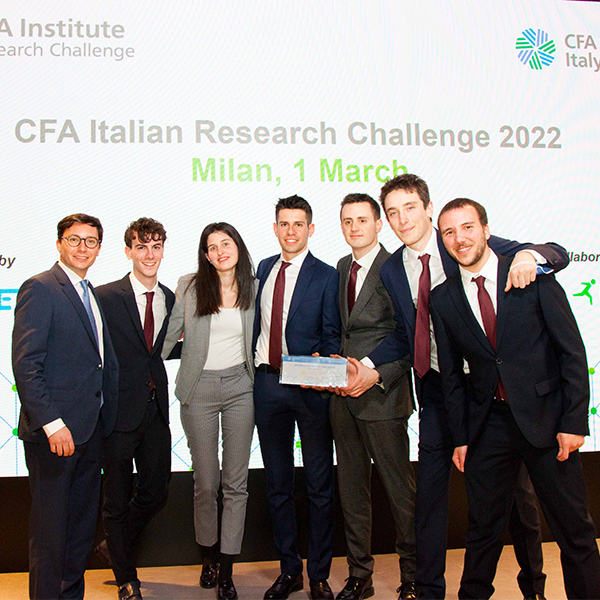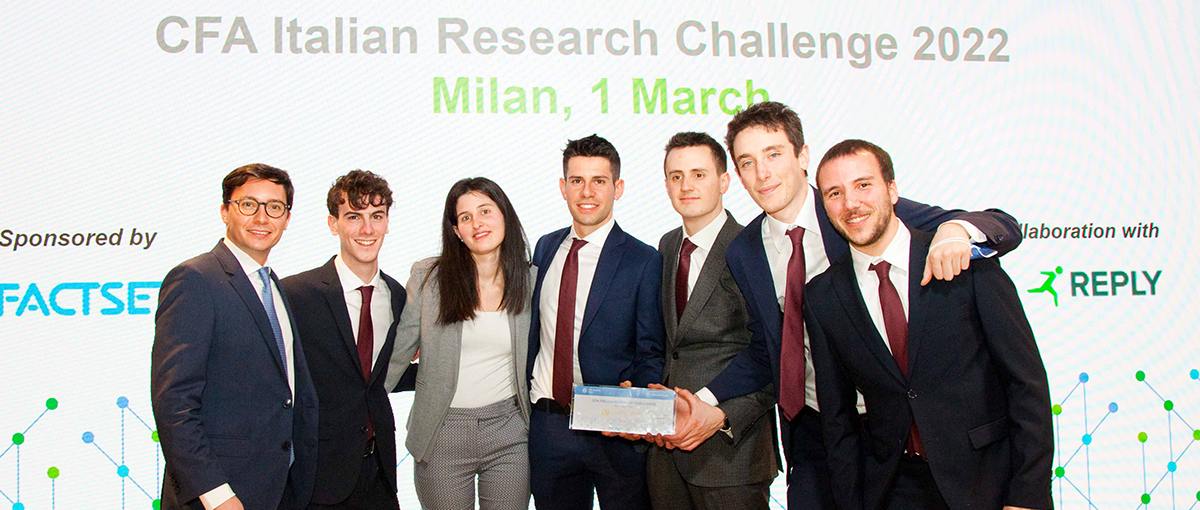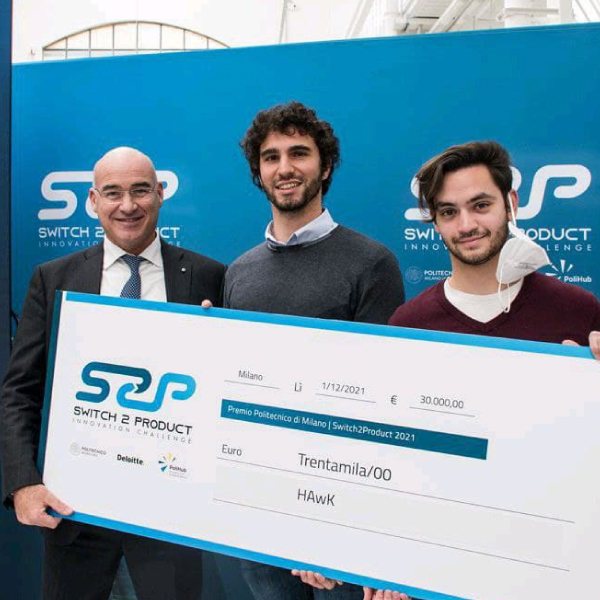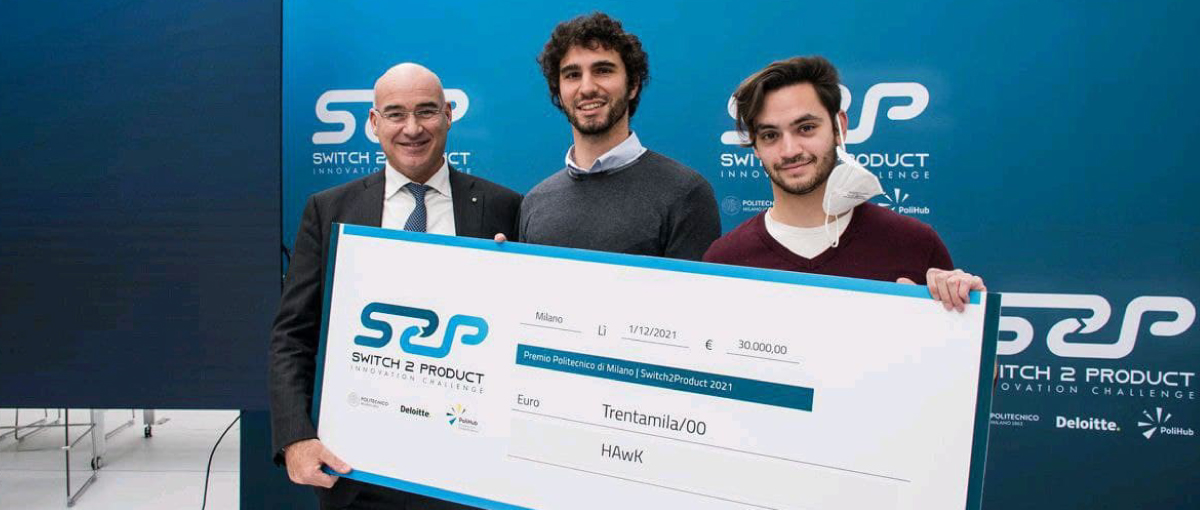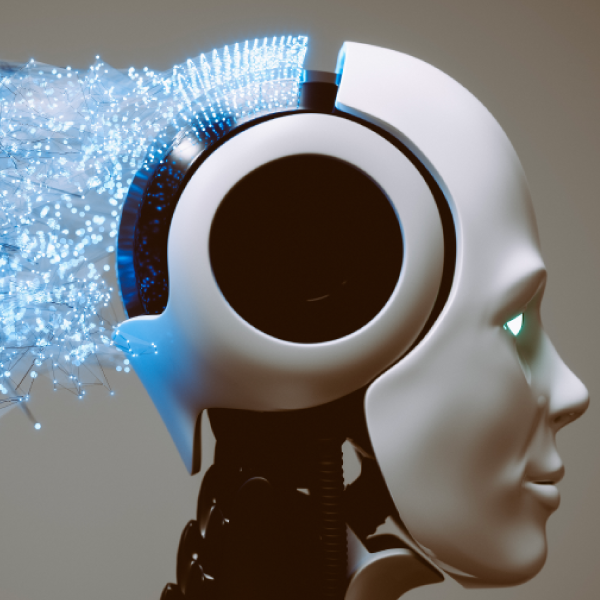Five engineers of the School of Management beat University Federico II Naples and University of Pavia with the financial analysis of Reply and prepare for the EMEA regional final. The world final will be held on 16 May.
The team from the School of Management of Politecnico di Milano won the Italian final of the CFA Research Challenge 2022, the global finance competition organised by the CFA Institute and promoted in Italy by CFA Society Italy with the valuable support of FactSet Italia and Kaplan Schweser.
The final round took place in Reply’s Milan headquarters on Tuesday 1 March, involving ten universities, 50 students and over 30 professionals. The Italian phase, coordinated by CFA Society Italy, saw the participation of teams representing the following universities: Università Cattolica, Politecnico di Milano, Ca’ Foscari di Venezia, Università di Roma Tor Vergata, University of Florence, University of Bologna, Libera Università di Bolzano, University of Pavia, Università Politecnica delle Marche and Università di Napoli Federico II.
Students Gianluca Dente, Alberto Gegra, Andrea Rampoldi, Alessandro Criniti and Francesco Saverio Pirolo, under the guidance of professors Laura Grassi and Marco Giorgino and CFA mentor Alberto Mari, presented their financial analysis of Reply’s stock to a panel of six experts from the financial sector: Mauro Baragiola, Luca Forlani, CFA, Marco Greco, Paolo Perrella, CFA, Patrizia Saviolo, CFA, and Carla Scarano. Second and third place went respectively to Università di Napoli Federico II and the University of Pavia.
Politecnico di Milano will go straight on to the EMEA (Europe, Middle East and Africa) regional final, which will be held on 28 April. As testament to the high quality of our students and the professionals who guide them, Italy already won the EMEA regional final in 2011, 2014 and 2016.
The World Final, on the other hand, will be held on 16 May 2022, pitting the winners from EMEA, the Americas and Asia Pacific against each other, and the winners will be officially announced on 17 May 2022.
“CFA Society Italy, in its many years of activity, has built a close relationship with the Italian universities to promote the principles of integrity and professional excellence to the younger generation”. CFA project coordinator Giuseppe Quarto di Palo said. “We are delighted to be able to offer universities and their talents the opportunity to measure themselves in a realistic competition, aimed at reproducing the experience of a research office of management companies or investment houses. We also offer the best students scholarships to the CFA Programme, in order to obtain a globally recognised certification in the financial sector”.
“The Research Challenge is an initiative that channels important objectives into the world of education and academia. It is becoming increasingly important to bring students closer to the job market, combining academic knowledge with the techniques and tools used by professionals in the financial sector. In addition, we want to highlight the excellent standards of Italian universities at European and global level”. Giuliano Palumbo, president of CFA Society Italy commented. “This project could not exist without the valuable contribution of the association’s volunteers and the partners who supported the initiative FactSet, Kaplan Schweser and Reply, companies that were researched by the students”.
“As Michael Jordan once said, talent wins games, but intelligence and teamwork win championships. I’d like to congratulate the students of the Politecnico di Milano who demonstrated not only above-average technical skills, but also and above all teamwork and spirit of cooperation aimed at achieving the final victory” stressed Stefano Di Rosa, CIIA, Senior Sales Rapresentative of FactSet Italia, sponsor of the Italian edition of the CFA Research Challenge since 2016.
“Year after year, the competition allows the best talents from Italian universities to pit their wits against professionals of the highest calibre, increase their knowledge of the fundamentals of equity research, develop soft skills and compare notes with each other”. commented Politecnico di Milano professors Laura Grassi, Assistant Professor of Investment Banking, and Marco Giorgino, Full Professor of Financial markets and institutions. “We are very proud of our team’s victory, which rewards our five members for their great sacrifices, and in turn makes them a reference for future colleagues next year. For them, this is the best way of entering the professional world and for our university it is a further acknowledgment of our quality. We are now looking to EMEA, with the will, commitment and desire to replicate the same result”.
“The CFA Research Challenge was definitely the toughest challenge of our lives, and at the same time the most stimulating experience on both a professional and personal level. It was an incredible opportunity that allowed us to work closely with our CFA mentor Alberto Mari, and with our professors Laura Grassi and Marco Giorgino, whom we’d like to thank very much. We would also like to thank the CFA Society Italy for making this possible and we look forward to carrying our country’s flag high in EMEA,” were the first words expressed by the Politecnico di Milano team after the win.
